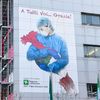Coronavirus Symptoms Continue Months after Recovery: UK Study

LONDON, KOMPAS.com – Continued fatigue and breathlessness are some of the coronavirus symptoms that continue after recovery, according to a small UK study.
More than half of Covid-19 patients discharged from the hospital reported ongoing coronavirus symptoms such as shortness of breath, tiredness, anxiety, and depression for two to three months after their initial infection.
The UK study was led by scientists at Britain’s Oxford University who looked at the long-term impact of Covid-19 in 58 patients hospitalized with the pandemic disease.
There is a range of coronavirus symptoms that continue after recovery.
Read also: Remdesivir has ‘Little or No Effect on Covid-19 Mortality: WHO Study
It found that some patients have abnormalities in multiple organs after being infected with the novel coronavirus and that persistent inflammation caused problems for some for months.
The study has not been peer-reviewed by other scientists but was published before review on the MedRxiv website.
"These findings underscore the need to further explore the physiological processes associated with Covid-19 and to develop a holistic, integrated model of clinical care for our patients after they have been discharged from hospital," said Betty Raman, a doctor at Oxford's Radcliffe Department of Medicine who co-led the research.
An initial report by Britain's National Institute for Health Research (NIHR) published last week showed that ongoing illness after infection with Covid-19, sometimes called "long COVID", can involve a wide range of symptoms affecting all parts of the body and mind.
Read also: Anxiety and Depression Spike in US Adults during Coronavirus Pandemic
The Oxford study's results showed that two to three months after the onset of the novel coronavirus, 64 percent of patients suffered persistent breathlessness and 55 percent reported significant fatigue.
MRI scans showed abnormalities in the lungs of 60 percent of the Covid-19 patients, in the kidneys of 29 percent, in the hearts of 26 percent, and the livers of 10 percent.
"The abnormalities detected ... strongly correlated with serum markers of inflammation," Raman said.
"This suggests a potential link between chronic inflammation and ongoing organ damage among survivors."
(Writers: Kate Kelland, Ann Maria Shibu | Editors: Alison Williams, Steve Orlofsky)
Source: https://www.reuters.com/article/idUSKBN27413I
Simak breaking news dan berita pilihan kami langsung di ponselmu. Pilih saluran andalanmu akses berita Kompas.com WhatsApp Channel : https://www.whatsapp.com/channel/0029VaFPbedBPzjZrk13HO3D. Pastikan kamu sudah install aplikasi WhatsApp ya.

































